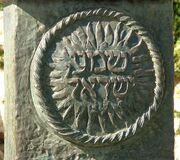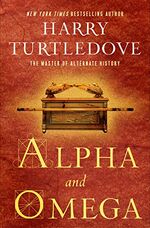No edit summary |
No edit summary |
||
| Line 8: | Line 8: | ||
Kupferman once again spontaneously recited the ''Shma'' (although only the more widely known first half) upon learning that a barrage of [[Iran (Alpha and Omega)|Iranian]] missiles aimed at Israel had been thrust aside by divine intervention.<ref>Ibid., p. 221.</ref> |
Kupferman once again spontaneously recited the ''Shma'' (although only the more widely known first half) upon learning that a barrage of [[Iran (Alpha and Omega)|Iranian]] missiles aimed at Israel had been thrust aside by divine intervention.<ref>Ibid., p. 221.</ref> |
||
| − | When the [[Jews (Alpha and Omega)|Jewish]] [[Messiah (Alpha and Omega)|Messiah]] and the [[Islam (Alpha and Omega)|Islamic]] [[mahdi (Alpha and Omega)|Mahdi]] made a pilgrimage to the Ark's resting place, |
+ | When the [[Jews (Alpha and Omega)|Jewish]] [[Messiah (Alpha and Omega)|Messiah]] and the [[Islam (Alpha and Omega)|Islamic]] [[mahdi (Alpha and Omega)|Mahdi]] made a pilgrimage to the Ark's resting place, Messiah [[Chaim Avigad]] recited a truncated form of the ''Shma:'' '''The Lord our God, the Lord is One''', paring it down to its most important point while diplomatically leaving out any specific reference to [[Judaism (Alpha and Omega)|Judaism]] or [[Israelite|Israel]].<ref>Ibid., p. 414.</ref> |
==''Sh'mah'' in "[[Before the Beginning]]"== |
==''Sh'mah'' in "[[Before the Beginning]]"== |
||
Revision as of 06:29, 26 August 2020

The words Sh'mah Yisrael inscribed on the Knesset Menorah in Jerusalem.
Sh'mah Yisrael (Hebrew: שְׁמַע יִשְׂרָאֵל; "Hear, [O] Israel") are the first two words of a section of the Torah, and is the title (sometimes shortened to simply Sh'mah, Shma, Shema or a number of other renditions) of a prayer that serves as a centerpiece of the morning and evening Jewish prayer services. The first verse encapsulates the monotheistic essence of Judaism: "Hear, O Israel: the LORD our God, the LORD is one" (Hebrew: שְׁמַע יִשְׂרָאֵל ה' אֱלֹהֵינוּ ה' אֶחָד), found in Deuteronomy 6:4, sometimes alternatively translated as "The LORD is our God, the LORD alone." Observant Jews consider the Sh'mah to be the most important part of the prayer service in Judaism, and its twice-daily recitation as a mitzvah (religious commandment). It is traditional for Jews to say the Sh'mah as their last words, and for parents to teach their children to say it before they go to sleep at night.
The term "Sh'mah" is used by extension to refer to the whole part of the daily prayers that commences with Sh'mah Yisrael and comprises Deuteronomy 6:4–9, 11:13-21, and Numbers 15:37–41. These sections of the Torah are read in the weekly Torah portions Va'etchanan, Eikev, and Shlach, respectively.
Sh'mah in Alpha and Omega
Israeli cabinet member Shlomo Kupferman escorted American reporter Brandon Nesbitt to see the newly discovered Ark of the Covenant. When Nesbitt profaned the Ark by touching it, despite the warnings of Kupferman and others, he was struck dead by God's will. Kupferman immediately recited the Shma in its complete form: "Hear, O Israel, the Lord our God, the Lord is One. Blessed be His glorious kingdom for ever and ever."[1]
Kupferman once again spontaneously recited the Shma (although only the more widely known first half) upon learning that a barrage of Iranian missiles aimed at Israel had been thrust aside by divine intervention.[2]
When the Jewish Messiah and the Islamic Mahdi made a pilgrimage to the Ark's resting place, Messiah Chaim Avigad recited a truncated form of the Shma: The Lord our God, the Lord is One, paring it down to its most important point while diplomatically leaving out any specific reference to Judaism or Israel.[3]
Sh'mah in "Before the Beginning"
Although Jewish, Jacob Dreyfus was not a particularly religious man. Nevertheless, he had a subconscious intuition that he should recite the Sh'mah before looking into the time-viewer to see what existed before the Big Bang. It was very likely that this spiritual reinforcement was what strengthened him enough to avoid automatically expiring upon seeing the face of God, like four Gentiles had before him.
Sh'mah in In the Presence of Mine Enemies
The Sh'mah was among the first elements of Judaism to be ritually taught to the children of secret Jews in Nazi Germany, after they were informed by their families of their true ancestry, beginning on their 10th birthdays.
Sh'mah in "Next Year in Jerusalem"
The Sh'mah was turned into a weapon of insurrection by the Second Irgun in the 22nd century. When Irgun agents Yakov, Sarah, Miriam, and Aryeh hijacked a bus in Palestine, they demanded that the passengers prove themselves to be Jewish. Eight of them immediately recited the Sh'mah and were let go, while the remaining 30 were gunned down as they attempted to flee. On the same night, Yakov hacked into Palestine's public address system to replace automated minarets' Muslim prayer calls with the Sh'mah and the "Hatikvah." Ironically, the Irgun undid their own cause by making a martyr out of Rabbi Chaim Perelman, who died at the hands of Yakov and Miriam with the beginning of the Sh'mah on his lips.
References
- ↑ Alpha and Omega, p. 184.
- ↑ Ibid., p. 221.
- ↑ Ibid., p. 414.
| ||||||||||||||||
| |||||
| ||||||||||||||||
| ||||||||

